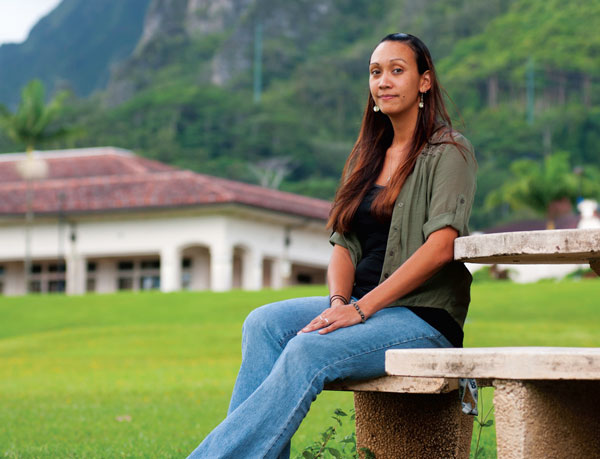NO QUICK FIX
Helena Kaleiki’s rehab program lasted 30 months, but she needed that much time to turn away from drugs, crime and despair.

Helena Kaleiki’s life sounds idyllic: a good job with hours that allow her time to attend college; two young sons and a new relationship; her own apartment and the money to pay for it. Basically, a great life.
It’s idyllic compared to six years ago, when she stood in front of a sentencing judge in Hilo and was told she had two choices: five-to-10 years at the Women’s Community Correctional Facility or two-and-a-half years at the Habilitat rehab facility in Kaneohe.
It was good for me to be in a program away from where I was used to.”
“My dad’s voice kept going over in my head,” says Kaleiki, now 36. “If I went to prison (on Oahu), he wouldn’t come visit me. He didn’t want to see his little girl behind bars.”
That helped her choose Habilitat, she says, even though clients aren’t allowed visitors for the first four months and then only sporadically afterward.
Kaleiki doesn’t like to dwell on a criminal past that includes check forgery, car theft and drug use. That’s far behind her now, so far behind that she recently spoke by phone for the first time in a decade with her oldest son, a boy who was just three when she was forced to give him up for adoption to an uncle. He’s now a young teenager. Their conversation touched Kaleiki deeply and is one thing she holds on to.
Her younger son, a toddler of 2 when she was arrested in a stolen car, is now 8, and being cared for by his grandparents. Someday soon, she expects to begin the legal process so her younger boy can be returned to her care.

“Just being able to talk to my (older) son – right now there’s nothing that anyone can say or do or put in front of me that can take that away from me,” she says. “I’ve accomplished too many goals. … I can walk around outside and I don’t have to worry that I owe someone something, or where I’m going to sleep. I know I have somewhere to go home to. There’s food in the refrigerator. I have a cat. Those little things make me happy now.”
The thoughts of her family kept – and continue to keep – her going. That, and the long-term care at Habilitat, in a supportive community of others going through similar challenges. It was therapy that allowed her to change her thinking, change her self-image and left her feeling entitled to start life afresh.
“I had been to other programs before and at that point I wasn’t getting any younger. I didn’t want to have to go through another program again. I didn’t want to be classified as the daughter who ended up going to jail and made nothing of herself. And I wasn’t being any kind of example to look up to for my children.”
As she looks back, Kaleiki realizes that the length of Habilitat’s program – two-and-a-half years – was crucial to her success. As well, it was important to be in a program outside her community and her comfort zone.
“It was good for me to be in a program away from where I was used to. If I ended up in another six-month program (on Hawaii Island), I would have slipped out somehow.
“When they first tell you it’s two-and-a-half years, it sounds really horrible. But you’re doing the same things over and over and it gets easier. I thought at one point that if I got to do this after the program, I might be somewhat normal and live a decent life. It’s just simple things: having a routine, getting up at 5 a.m., doing aerobics, making and eating breakfast, doing laundry twice a week, learning to communicate with people differently, learning to deal with your emotions. Habilitat was a way of starting fresh.”
For Kaleiki, starting fresh also meant looking at herself in a new way.
Being in Habilitat taught me and my dad both how to be independent and not to enable each other.”
“I felt like I was bad. I felt like everything I had done was wrong, and that these were all my consequences wrapped up into one and I was being punished. At that point, no one in my family wanted to talk to me, and I didn’t have my children, and neither my family nor my children wanted anything to do with me.”
While changing her self-image was important, so was rebuilding her relationship with her father, who had raised her after her parents divorced. Maybe it was also learning how to grow up – something she thinks she stopped doing when she was 13 or 14 and began taking drugs.
“I had never rented anything by myself or had the keys to my own place. Everything was based on somebody else. So for me it felt good to find my own place, find my own job, even walk to work in the rain. Before I would just cry to my dad – ‘I can’t go anywhere, I don’t have a car’ – and he would come and pick me up, or pay for a car or buy a bike … something. Being in Habilitat taught me and my dad both how to be independent and not to enable each other.”
Now, as a student at Windward Community College, she’s working toward a degree that will eventually allow her to be a veterinary assistant. She dreams of working to build the collection of animals at the small zoo in Hilo. Until then, she’s happy working for a shuttle company with hours that allow her to take classes.
“What helped me? Habilitat, family and the independence I’ve gained,” she says. “I know for a lot of women, in general, we end up in bad relationships and you cater everything to him. And now I’m in a relationship with another Habilitat graduate, but I’m still very independent. I don’t want him to help me with a lot of things. If I can’t do it, then I’ll ask him, but I like to try to do it myself first.
“And I go back to Habilitat twice a week to just remember what it’s like to be there, to share experiences, to just volunteer depending on what therapy they’re doing. For holidays they have dinners and this past Labor Day they went to the park next door and I went to hang out with them. Or I go just to sit in on meetings and I learn new things too. It’s reinforcement.”